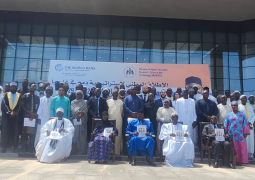This, coupled with the doubling of transport fares through dividing routes by drivers at their discretion has even made the situation worse.
The Point has examined the situation within the Greater Banjul areas.
However, a journey by vehicles that should approximately last 30 minutes now takes over three hours on some roads notably the Serekunda-Brikama Highway and as a result of that, school-going children and office staff are the main victims of the traffic congestion, many people believe it is high time government and non-government agencies combine efforts to find a permanent solution to what looks like a never-ending problem.
Babacar Jallow, a taxi driver, who operates within the Kanifing area has blamed the welder and carpentry men who normally operate along the highway for contributing to the traffic congestion.
"Welder men who usually open a garage, sometimes leave their workshops and choose to come close along the roadside and place their materials. For example, some of the vehicles parked here, have been here for over ten years," he said.
Fabakary Minteh, also blamed the heavy traffic congestion on the drivers who usually parked their vehicles along the highway.
However, Mr Minteh urged the government to set aside special parking spaces for drivers.
"Some of the drivers don’t have a place to park their vehicles. But I blame them partially, at least when they have a place to park, they will not park their vehicles along the road. Drivers lack parking spaces that’s why they choose to park on the road," he added.
Babucarr Ceesay, a resident of London corner, blamed the traffic congestion on the women who normally sell on the streets. Ceesay is of the notion women should stay in the market to sell instead of coming along the roadside.
"These women used to come to the road and sell their commodities. It is really difficult; how can drivers drive correctly when these women are selling along the road," he quizzed.
He said the issue is further compounded by the size of the roads which is coupled with the large number of cars plying the highway.
He called on the government of The Gambia and National Road Authority (NRA) to improve the state of feeder roads in order to ease the heavy traffic congestion.





